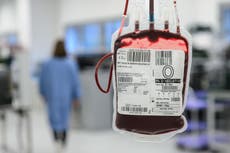Who can give blood and how can you do it?
The UK needs nearly 400 new blood donors per day just to meet demand
The NHS is facing a blood supply shortage that has led to the NHS Blood and Transplant (NHSBT) service issuing its first ever amber -lert status.
The NHSBT says its blood stock is “critically low” as it currently holds just over three days days of blood stocks and only two days worth of O type blood. The service aims to hold more than six days worth of blood in stock.
Existing O negative and O positive donors have been asked to book donations because O negative is a universal blood which can be used on any patient, including those who do not know their blood types.
The shortage means that the NHSBT has asked hospitals to limit its use of its blood supplies and save it for the most urgent patients and treatments.
Wendy Clark, interim chief executive of NHSBT, said in a statement: “Asking hospitals to limit their use of blood is not a step we take lightly. This is a vital measure to protect patients who need blood the most.
“Patients are our focus. I sincerely apologise to those patients who may see their surgery postponed because of this.”
To boost supplies, around 400 new blood donors are needed every day in the UK and, once taken, blood can be stored for up to 35 days.
Here’s what to know about giving blood.
Who can give blood and why should you give blood?
The criteria for those able to give blood include:
- Being generally fit and well
- Being aged between 17 and 65
- Weighing less than 25st and more than 7st 12lbs
- Having “suitable veins” and meeting eligibility criteria, both of which will be checked on site
Those who can’t give blood include:
- People who have had cancer
- Those who have heart conditions
- Those who have had blood transfers or an organ transplant
- Those who have tested positive for HIV
- Hepatits B or C carriers
- If you have injected non-prescribed drugs into your body including body-building drugs and tanning agents
Giving blood means that you can help people with anaemia, those with cancer blood disorders, and those having surgery.
Blood transfusions can be vital for people with certain medical conditions or people having surgery. It can even help improve the quality of life for people with terminal conditions.
Where can you donate blood?
There are 23 permanent blood donation centres in the UK in several major towns and cities. Mobile donor sessions are also run at churches or other community centres.

How to book an appointment to give blood
You can book a blood donation online, but if you have not donated blood before you must register to give blood first.
Once you have logged on, you can check for the closest location to you and the best time for an appointment. It’s worth noting that the soonest you could get an appointment may be a few weeks away as it will depend on demand.
Men are able to give blood every 12 weeks and women can do so every 16 weeks.
What to know about giving blood if it’s your first time
The NHS needs around 135,000 new donors each year.
If you would like to become a blood donor, firstly you will need to register your details and you will be asked some basic questions to see whether or not you are eligible.
Once you have registered and booked a slot, be sure to arrive at the donation centre on time whether the appointment should take no longer than five to 10 minutes.
The NHS recommends drinking plenty of water before you arrive. If it is your first time giving blood you will be asked a few questions and called in for a private health screening to ensure that you have iron in your blood before donating.
Once you are ready to give blood, you will be led to a seating area where a needle will be inserted into your arm while you give blood. The process is relatively painless and usually lasts only a few minutes.
To find out more about giving blood, visit blood.co.uk
Join our commenting forum
Join thought-provoking conversations, follow other Independent readers and see their replies
Comments


Bookmark popover
Removed from bookmarks